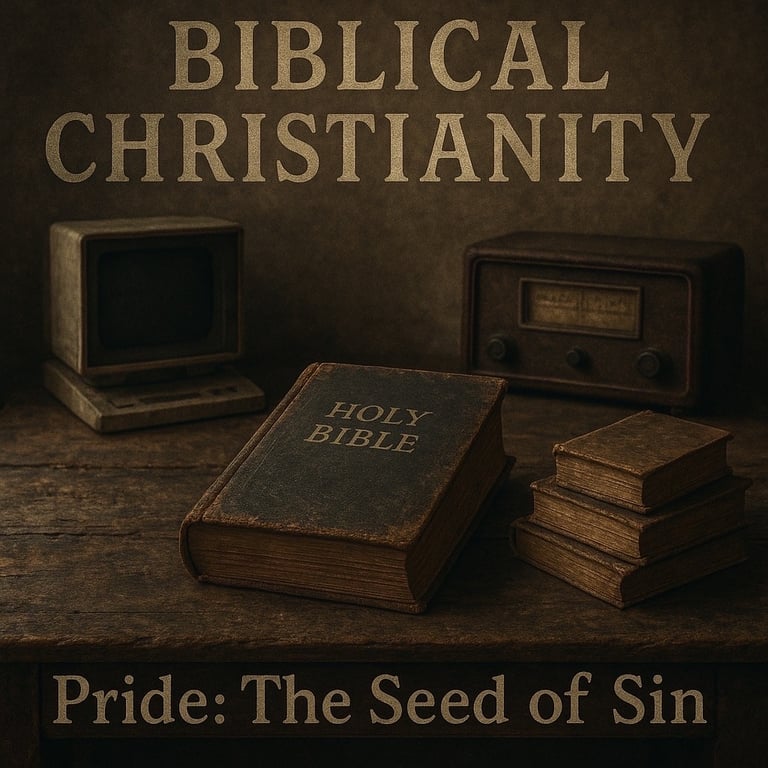

Chapter 1: What Is Pride?
Pride is not confidence.
It is not strength.
It is not even joy in something good.
Pride is dislocation.
It is seeing ourselves apart from God.
It is putting the self where only God belongs—on the throne.
Pride is the soul’s declaration:
“I am enough. I know enough. I deserve more.”
It looks like arrogance.
It sounds like boasting.
But it also whispers behind envy, anxiety, even despair.
It is the sin beneath the sin.
The Lie of Independence
In the garden, Adam and Eve did not murder.
They did not steal.
They did not hate.
They simply reached—because they believed they knew better than God.
That is pride.
Pride doesn’t always shout.
Sometimes it simply says, “Did God really say…?”
It twists trust into suspicion, obedience into self-assertion.
The serpent offered knowledge.
But behind that offer was something else:
“You could be like Him.”
Defining It Biblically
Pride in Scripture is never neutral.
It is always something to be humbled.
To be brought low.
To be opposed by God Himself.
“God opposes the proud,
but gives grace to the humble.” — James 4:6
It is a lifting of the heart—
not in worship,
but in rivalry.
“The pride of your heart has deceived you.” — Obadiah 1:3
“Pride goes before destruction.” — Proverbs 16:18
This kind of pride doesn’t just blind.
It deceives.
It destroys.
The Great Exchange
The root of all sin is the refusal to acknowledge God as God.
Paul says in Romans 1:
“They did not honor Him as God or give thanks to Him,
but they became futile in their thinking.”
That’s pride.
It sees the Creator and says,
“I’ll take it from here.”
Worship is replaced with entitlement.
Thankfulness with self-glory.
Dependence with defiance.
It is not just wrong thinking.
It is rebellion in the heart.


Pride Wears Many Masks
Pride is not just for the strong.
It lurks in the insecure.
It thrives in both the spotlight and the shadows.
It says:
– “Look at me.”
– “Don’t forget me.”
– “They owe me.”
– “I’m better than them.”
– “I’m worse than everyone.”
Self-pity can be pride.
So can perfectionism.
Even fear can stem from pride:
“What if I lose control?”
Pride never rests.
Because pride always has something to prove.
The Opposite Is Not Shame
The opposite of pride is not self-hatred.
It is humility.
But biblical humility is not weakness or groveling.
It is strength under surrender.
It is knowing who you are—and who you’re not.
“He has told you, O man, what is good…
to walk humbly with your God.” — Micah 6:8
To walk humbly is not to disappear.
It is to walk with God, not ahead of Him.
To speak, but not to boast.
To act, but not to exalt.
Christ Is the Cure
The entire Gospel is a war against pride.
Jesus did not grasp for power,
though all power was His.
He emptied Himself.
He stooped low.
He rode into town on a donkey.
He knelt to wash feet.
He was mocked, stripped, and crucified.
And never once did He say,
“Don’t you know who I am?”
And yet He was—the I AM.
What Does It Matter?
If we don’t understand pride,
we will not understand the fall of man.
Or the failure of kings.
Or the rejection of Christ.
Or the brokenness in our own hearts.
Pride is the unseen root growing under every sin.
It blinds us to our need for God.
It resists the very grace that would save us.
It convinces us that we are the exception, the center, the master.
To follow Christ, we must begin by laying pride down.
Because the way up in God’s Kingdom always begins by going low.
Reflection and Questions
Where in my life do I subtly say to God, “I’ve got this”?
How do I react when I'm overlooked, corrected, or outdone?
Do I focus more on my image than my heart?
Have I confused humility with shame—or pride with strength?
What would it look like today to walk humbly with God?